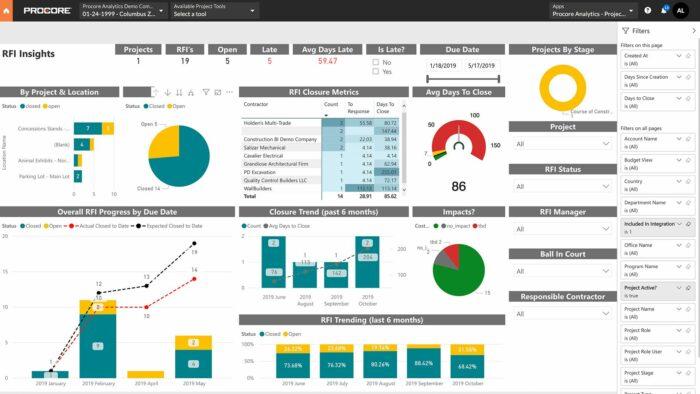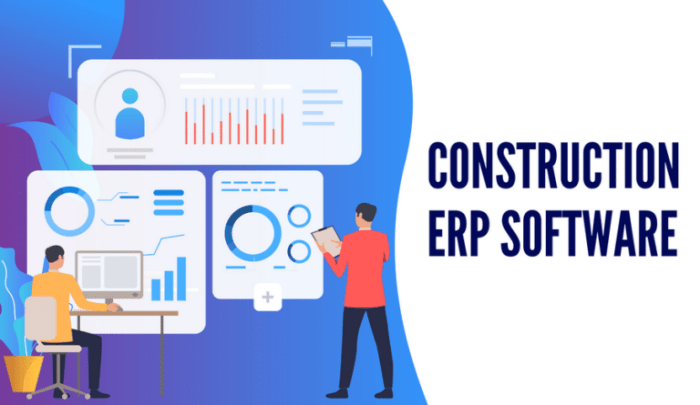ERP software for builders offers a powerful solution to streamline construction operations, from project management to financial accounting. Modern builders face increasing complexity, and this software provides a centralized platform for managing all aspects of a project, from initial bidding to final payment.
Imagine a seamless workflow where all project data, including schedules, budgets, materials, and labor costs, is accessible in one place. This level of visibility allows for better decision-making, improved resource allocation, and ultimately, increased profitability.
Construction businesses face unique challenges, from managing complex projects to juggling multiple subcontractors and materials. Effective project management, accurate inventory tracking, and seamless communication are crucial for success. This article delves into the world of ERP software specifically designed for builders, exploring its benefits, key features, and how it can revolutionize your construction business.
Understanding the Need for ERP in Construction
Traditional methods of managing construction projects often rely on spreadsheets, emails, and disparate software systems. This fragmented approach can lead to inefficiencies, errors, and lost revenue. ERP software for builders offers a centralized platform to consolidate all aspects of your business, from project planning and scheduling to accounting and customer relationship management (CRM).
A robust ERP system for construction companies can significantly enhance profitability and productivity by:
- Improving project visibility: Real-time tracking of project progress, costs, and resources.
- Optimizing resource allocation: Efficiently managing materials, labor, and equipment.
- Streamlining communication: Facilitating seamless communication between different teams and stakeholders.
- Reducing errors and delays: Automating processes and providing accurate data.
- Boosting financial management: Accurate financial reporting and cost control.
Key Features of ERP Software for Builders
A comprehensive ERP solution for construction businesses should encompass a range of features tailored to the industry’s specific needs. These include:
Project Management & Scheduling
Sophisticated tools for planning, scheduling, and tracking projects from initiation to completion. This includes features like Gantt charts, critical path analysis, and resource allocation modules.
Inventory & Procurement
Centralized inventory management systems to track materials, monitor stock levels, and automate procurement processes. Integration with suppliers and vendors is essential.
Accounting & Finance
Accurate financial reporting, cost tracking, and invoicing capabilities. This often includes modules for accounts payable, accounts receivable, and general ledger.
CRM & Customer Relationship Management
Enhanced customer relationship management to manage leads, track projects, and maintain communication with clients. Building strong customer relationships is crucial for repeat business.

Source: clickup.com
Construction Estimating & Bidding
Powerful tools for creating accurate estimates, managing bids, and tracking project profitability. Integration with project management is crucial for accurate cost estimations.
Reporting & Analytics, Erp software for builders
Customizable reports and dashboards to provide real-time insights into project performance, financial health, and operational efficiency. Data-driven decisions are essential for informed business strategies.
Choosing the Right ERP Software for Your Construction Company: Erp Software For Builders
Selecting the right ERP software for your construction company is a critical decision. Consider factors such as:
- Company size and needs: Choose a system that scales with your business growth.
- Budget constraints: Compare pricing models and features.
- Integration capabilities: Ensure compatibility with existing software.
- User-friendliness: A system that is easy to learn and use is crucial for staff adoption.
Frequently Asked Questions (FAQ)
- Q: How much does ERP software for builders cost?
A: Pricing varies significantly depending on the vendor, features, and the size of your business. Contact vendors for personalized quotes.
- Q: Can ERP software integrate with other construction management software?
A: Many ERP solutions offer APIs and integration capabilities to connect with other software.
- Q: What are the benefits of cloud-based ERP software for construction?
A: Cloud-based solutions offer flexibility, accessibility, and scalability, often at a lower upfront cost.
Conclusion
ERP software for builders can significantly streamline operations, improve profitability, and enhance overall business performance. By choosing the right system and understanding its features, your construction company can unlock new levels of efficiency and success in the competitive construction market. Implementing an ERP solution is a strategic investment that can pay dividends in the long run.

Source: tripasik.com
Disclaimer: This article is for informational purposes only and should not be considered financial or professional advice. Always conduct your own research and consult with relevant professionals before making any decisions.
Call to Action
Ready to take your construction business to the next level? Explore ERP software solutions tailored to the unique needs of builders today! Click here to learn more.
In conclusion, implementing ERP software for builders can revolutionize project management, accounting, and overall business operations. By centralizing information and automating processes, builders can significantly improve efficiency, reduce errors, and ultimately achieve greater success in the competitive construction market. The future of construction is undeniably linked to effective software solutions.
FAQ Section
What are the typical costs associated with implementing ERP software for a construction company?
ERP implementation costs vary greatly depending on the size of the company, the complexity of the system, and the scope of customization required. Factors such as software licensing fees, implementation consulting services, data migration, and training play a role in determining the overall expense.
How does ERP software for builders help with project scheduling and resource allocation?
ERP systems provide tools for creating detailed project schedules, assigning resources effectively, and tracking progress against timelines. Real-time visibility into project milestones and resource availability helps avoid delays and optimize workforce allocation.
What are some common challenges builders face when transitioning to an ERP system?
Resistance to change from employees accustomed to existing processes, integrating legacy data, and ensuring proper training are common challenges. Careful planning, communication, and employee support are crucial for a smooth transition.